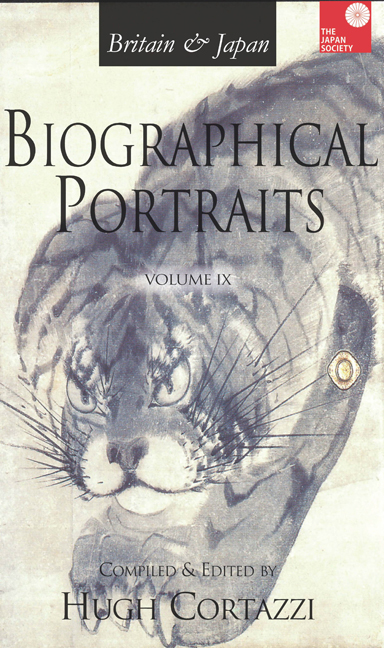Book contents
- Frontmatter
- Contents
- Introduction
- List of Contributors
- Index of Biographical Portraits in Japan Society Volumes
- PART I JAPAN IN BRITAIN: THINGS JAPANESE
- PART II BRITAIN IN JAPAN: TRADE
- BRITISH ACTIVITIES
- MISSIONARIES
- MUSIC, DRAMA AND FILM
- EPISODE
- PAINTERS
- JOURNALISTS
- JAPANESE WOMEN PIONEERS
- PART III SCHOLARS AND WRITERS: JAPANESE
- BRITISH
- PART IV POLITICIANS AND OFFICIALS: JAPANESE
- BRITISH OFFICERS
- BRITISH JUDGES AND A DIPLOMAT
- BRITISH POLITICAL FIGURES
- Index
20 - Kazuo Kikuta (1908-1973), Japanese Impresario and Lover of Charles Dickens: A Personal Memoi
Published online by Cambridge University Press: 30 April 2022
- Frontmatter
- Contents
- Introduction
- List of Contributors
- Index of Biographical Portraits in Japan Society Volumes
- PART I JAPAN IN BRITAIN: THINGS JAPANESE
- PART II BRITAIN IN JAPAN: TRADE
- BRITISH ACTIVITIES
- MISSIONARIES
- MUSIC, DRAMA AND FILM
- EPISODE
- PAINTERS
- JOURNALISTS
- JAPANESE WOMEN PIONEERS
- PART III SCHOLARS AND WRITERS: JAPANESE
- BRITISH
- PART IV POLITICIANS AND OFFICIALS: JAPANESE
- BRITISH OFFICERS
- BRITISH JUDGES AND A DIPLOMAT
- BRITISH POLITICAL FIGURES
- Index
Summary
KAZUO KIKUTA WAS my boss at Tōhō Theatre Company from 1963 till his death in 1973. I consider him an unsung hero, who helped to save Japan from urban unrest and the Japanese from despairing in those bleak post-war years, and also as someone, whose enduring love of Dickens – Oliver Twist in particular – paved the way for the later influx of the made-in-UK musicals to Japan.
By the time I graduated from New York University's theatre arts department in 1963, returned to Tokyo and asked for a job with Tōhō , Kikuta Kazuo had long been a national icon for the popular commercial theatre, as opposed to the state subsidized theatres; he was not only an implausibly prolific playwright (he is reputed to have written one thousand and several hundred original and adapted plays, in his prime ten full-length plays a year), theatre producer, director, infallible talent scout but also managing director of Tōhō's Theatre Department, part of the colossal Hankyū Tōhō concern.
Hankyū owned numerous companies ranging from thriving Hankyū Railways, Hankyū department stores, an internationally known division for production and distribution of films, the world's unique unmarried females only Takarazuka Revue Theatre with its ever increasing fanatic fans, a nation-wide chain of cinema houses, a music publishing house, costume and backstage production units, etc.
Kikuta, who did not own a single share in Tōhō-Hankyū concern, was a respected member of the Hankyū-Tōhō board of directors. His position was secured solely by his inexhaustible talent and hard work. When he declared that he wished to buy the exorbitantly priced Japanese language rights to My Fair Lady, his conservative, risk-averse colleagues on the board were horrified and hostile; but the meek, diminutive man with a moustache, blinking his beady eyes behind mushroom-thick circular glasses stood firm. When the first ‘imported’ Broadway musical, directed by Kikuta, opened in late 1963, it was an instant, resounding success; people slept outside the box office to buy returned tickets.
Had it not been for My Fair Lady's impressive success and Kikuta's determination to go on introducing Broadway plays and musicals, I would not have been engaged to represent him in New York at such a young age and so soon after my graduation.
- Type
- Chapter
- Information
- Britain & Japan Biographical Portraits Vol IX , pp. 236 - 244Publisher: Amsterdam University PressPrint publication year: 2015

